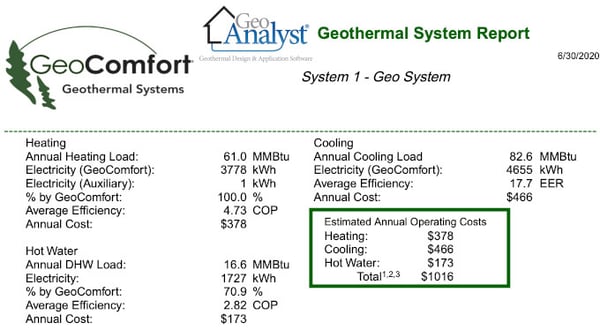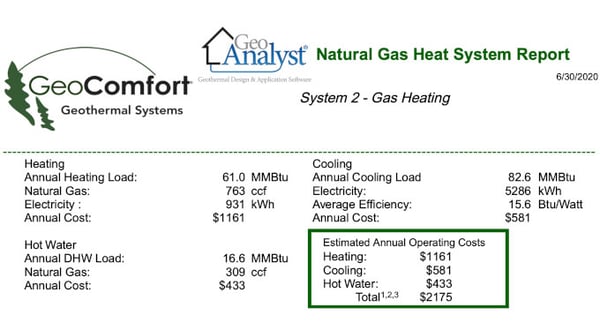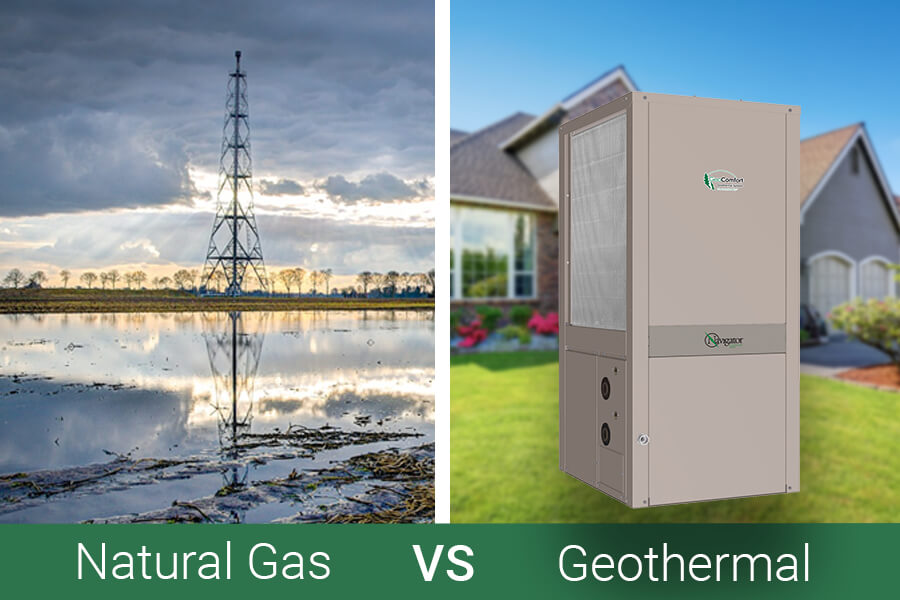In a previous case study, we covered how a system that uses propane alongside a traditional cooling unit stacks up against geothermal. Around 14 million homes in the United States use propane and, while that is far from insignificant, we'd like to look at a much more common fuel source today. Natural gas. Over 48% of American households burn natural gas to heat their homes which, of course, needs to be supplemented with an additional cooling system to cover all seasons that we experience across the states.
However, some home and building owners are looking for a better solution when it comes to keeping their spaces comfortable. Whether it's a new construction project or a retrofit application on an existing home, the numbers show that geothermal is a highly efficient and cost-effective solution, especially when compared to traditional HVAC technologies. When this homeowner was looking through their options, they found that, not only was geothermal more renewable, quieter, and more efficient; it also offered significant savings year after year.
Savings When Switching from Natural Gas to Geothermal
Savings on Domestic Hot Water
From washing your clothes, to washing your dishes, to washing your... self... We use more hot water every day than most people realize. In fact, the average 4-person household uses over 63 gallons of hot water per day! That's almost 16 gallons per person, and that number is even higher in the winter. With that level of use, it's critical that the modern homeowner takes note of how to save in this area. For this Southern Illinois homeowner - let's call him Phil - hot water costs were over $36 per month. This translates to about $433 per year!
Now, with a GeoComfort geothermal unit in the mix, the savings start pouring in. Almost every one of our GeoComfort heat pumps are equipped with a part called a desuperheater. This equipment takes the excess heat generated in the normal operation of the unit and sends it to heat part of your daily hot water needs. For Phil, the geothermal unit covers 70.8% of all his hot water needs and will reduce the water heating portion of his bills by 60%! Installing geothermal will take his annual hot water costs from $433 to $173, or an average of just $14.42 per month.
Geothermal Savings on Cooling Costs
In a traditional system where natural gas covers the heating, homeowners will have to install some sort of cooling solution, typically in the form of a standard AC unit. In Phil's case, he had a pretty efficient unit installed already, but a GeoComfort unit was still 20% cheaper than his current solution!
With an annual cooling load of 82.6 MMBtu (million Btu), Phil has a large space to keep cool that puts significant demand on an inefficient system. With his traditional AC unit, his monthly costs were just over $48 per month for cooling, totaling around $581 annually. Remember, this standard AC system doesn't contribute excess energy to hot water assist, so the inefficiencies here also contribute to the high water heating costs. However, with a new geothermal unit, Phil's annual cooling bill is reduced to a cool $466 per year. Go ahead, Phil! Order the extra guacamole!
How Geothermal is Cheaper Than Natural Gas
There are many reasons that someone would want to switch to geothermal. Environmental impact, quiet operation, long system life... The list goes on! However, as we'll see, the exorbitant heating costs were the tipping point for Phil. For a home of his size, Phil's annual heating load was around 61 MMBtu, and the natural gas furnace had an efficiency of around 80% which, in the gas furnace industry, is standard efficiency. At its low efficiencies and high heading load, the gas furnace cost Phil a whopping $1,161 to operate! Ouch...
When calculating the new costs with an appropriately sized GeoComfort unit, Phil's burdens get considerably lighter. The difference comes down to fuel and efficiency. Prices for electricity are much more stable than prices for in-home natural gas so, since our geothermal heat pumps are powered by electricity, the homeowners get consistency with their comfort. In the context of efficiency, we also see some major wins for geothermal. The gas furnace was a standard 80% efficiency model, meaning that, for every 1 unit of fuel used the unit produces 0.8 units of useful heating. Phil was losing useful energy in the inefficient combustion process. GeoComfort units are masters of efficiency. For starters, they are built with top-of-the-line components for maximum savings and system life. However, their greatest benefit is their utilization of electricity. This specific GeoComfort geothermal heat pump has an efficiency rating of 473% in heating mode, meaning that, for every 1 unit of electricity used, the system produces 4.73 units of useful heat for Phil's home. All of this is possible because a geothermal unit is able to harness the stored heat just below the earth's surface. Find out more about that here.
At the end of the day, the switch to geothermal saved Phil 67% on his heating bills, bringing them down from $1,161 per year to $378 annually! That's only $31 per month to heat his home, all with one efficient system that handles his home's heating, cooling, and hot water needs. If you're curious about the details, scroll down to see the reports we delivered to this homeowner!


Interested in learning more about how much you can save by making the switch to a geothermal system? Contact us today and get a free geothermal design!



